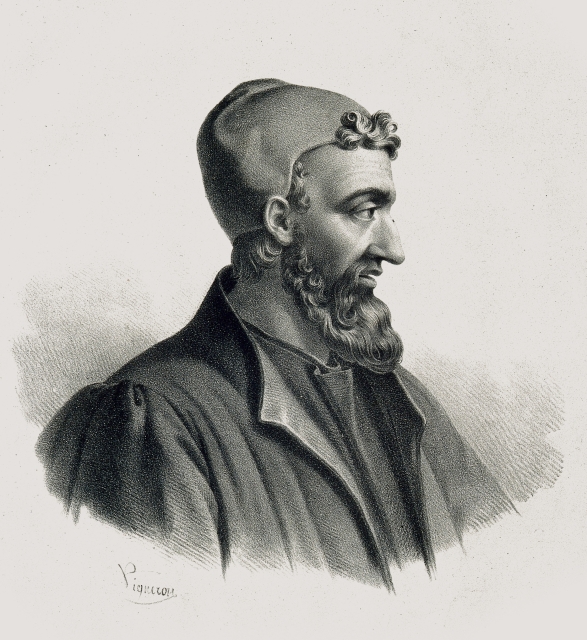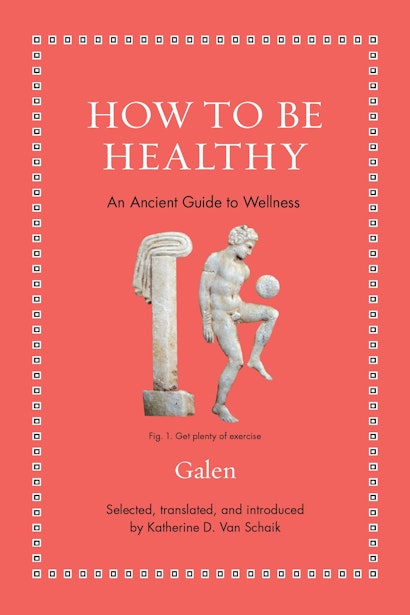“Well, Dr. Van Schaik, you’ve read Galen. Would you recommend bleeding this patient?” joked a physician colleague who knew of my background as a classicist and historian. His point was well-taken. What use to today’s physicians is the writing of Galen, an educated but pompous and (we now see, in 2023) misguided healer who lived 1,800 years ago?
Whenever I teach Galen—to undergraduates, medical students, or the public—I see afresh that Galen fully appreciated the most fundamental debates about the nature of knowledge in medicine. I describe Galen’s profound commitment to observation and to learning all he could about his patients. He exhibited a remarkably modern view not just of illness, but more broadly, of the idea of health. Of course, he wanted to know every detail about patients’ illnesses, acute and chronic. But he also inquired after their habits, their thoughts, their temperament, their diet and exercise. He wanted to see their effluvia, to smell the sick room, to hear the reports of those who cared for them. He was unafraid of the human body in its full spectrum of health and disease. He was a consummate observer.
I describe for students a type of patient that Galen may have seen. Sweating, hot to the touch, panting, tossing and turning in twisted bedclothes, with a racing and strong pulse, perhaps even suffering from delirium. He noted such behaviors and symptoms intently and sensitively. What would happen, I ask, if a physician removed a half-liter of blood from this person? Surely Galen would have recognized that the person’s body then felt cooler to his touch, the diaphoresis slowed, the patient felt calmer, and the breathing became shallower. Of course, we now know that bleeding the patient in this way is not, in fact, fixing the underlying problem (which, in many cases, was infection), but to a close observer, the treatment clearly led to an immediate reduction in distressing symptoms. Those observations supported the logic of persisting in this practice.
And then I ask: what clinical observations are we misinterpreting today? What diseases are we treating inappropriately, because we currently lack the insight to link observations with underlying biological mechanisms? Studying Galen is useful for many reasons, not least because he draws attention to limitations in our own paradigms and ways of thinking. He encourages us to recognize that, even though we know more about human health and disease, we still contend with many of the same illnesses that he saw—trauma, infection, cancer, heart attacks, strokes. While we live longer than many in the ancient Greco-Roman world, and while we are certainly better at treating many of the conditions that Galen would have seen, we still die from them. Ischemic heart disease, cancer, infection, strokes, and traumatic injuries made up 61% of causes of death in the United States in 2021. I would much rather be treated by an American physician in 2023 than a Greco-Roman physician in 180. However, as any physician in any era would tell you, there is still much that we simply do not know about human health and disease.
Galen considered carefully the problem of the sheer volume of information in medical observation and practice, especially as this challenge was applied in the context of medical decision making. Galen said in On the Method of Healing 3.7: “And if I knew how to discover precisely the nature of each person, like I think Asklepios [legendary founder of medicine, and prominent healing divinity] did, I would myself be like him. But since this is impossible, I have decided to approach as closely as is possible for a man, and myself, to practice this, and to exhort others [to do so]”.[1] Even the great Galen recognized that knowledge of all in medicine is an unattainable goal for a human.
And yet in the last few years, new technologies have promised to accomplish “knowledge of all”—and they are not human although at times seem humanlike. Artificial intelligence methods, with their ability to absorb, synthesize, and survey vast quantities of data, aspire to be like the proverbial all-knowing god Asklepios. ChatGPT passed Steps 1, 2 (Clinical Knowledge), and 3 of the US Medical Licensing Exam. The model was not tested on the Step 2 Clinical Skills portion, in which examinees interact directly with human standardized patients to make diagnoses. However, a more recent study compared physician and AI chatbot responses to patient questions posted on a public social media forum. The healthcare professionals evaluating the responses preferred the chatbot’s, rating them significantly higher for both quality and appearance of empathy in comparison to those provided by the human physician.
What does this mean for the implications of considering Galen’s epistemology alongside modern concepts of health, if humans have invented a tool that possesses far more medical knowledge than a human physician, and may well express more empathetic language, too?
Galen was agonistic and vociferous, unafraid to tell rival physicians when and exactly how he disagreed with them. One of his debates with the Empiricist school of medical thought and practice involved the development of theories. Galen’s writings on the subject are sophisticated and subtle, but I will share the core principles here despite the risk of oversimplification. In short, Empiricists believed it was possible to acquire enough experience, both directly and indirectly, to attain expertise in the art. The result was that pattern recognition (as we might call it today) would enable a physician to make a diagnosis and to pursue appropriate treatment, without recourse to advanced theoretical frameworks of health and disease. Galen, however, emphasized the extraordinary variability of human health and manifestations of disease, arguing that no one could see every presentation of every possible disease in a lifetime. And he argued that such pattern-recognition approaches to knowledge do not inform beneficial practices to respond to a disease no one had ever seen before. Theories of disease were therefore necessary, Galen maintained, in part to facilitate an approach to disease states for which diagnosis was uncertain and therapy was unknown. Such an argument has renewed relevance for a post-COVID world. How do we diagnose disease and reach treatment decisions when we encounter a new pathological condition, even today?
The debates around artificial intelligence in medical contexts circle the same issues. AI is limited by the information that is fed into it—what it sees, and what others have seen. In part because of this limited loop of information, AI is prone to hallucinations, in which the system uses the information it currently possesses to create an output that is incorrect or nonsensical. A study focused on AI recommendations for cancer care showed that the model’s outputs conflicted with published National Comprehensive Cancer Network guidelines 35% of the time. Results were hallucinated for 12.5% of outputs. AI is very good at recognizing patterns, but when inputs do not fit the mold, AI not only fails—it generates dangerously convincing falsehoods, forcing the output to fit the pattern, and even tweaking it to ensure that it does.
Many emphasize the potential of AI in healthcare, especially as a diagnostic aid and clinical decision tool for use by careful, observant physicians. At the same time, these modern information-gathering opportunities bring us back to fundamental debates about the nature of knowledge in medicine. Galen outlined the challenges of integrating observation, etiology, and decision making sufficiently well that millennia of physicians and scribes saw fit to transmit, painstakingly and with great expense and manual effort, his arguments and observations. He may well also be guilty of forcing pathological conditions to fit into his own framework, but he engaged deeply and thoughtfully with medical epistemologies, their flaws, and the implications of such flaws for patient care.
So, in short, “No, I would not recommend bleeding that patient (unless he had hemochromatosis!).” But I would argue that Galen provides an important perspective on the problems inherent in the human struggle to restore patients to health, with notes of both optimism and caution. Although his specific therapies and his explanations of physiology have been superseded, his writings still trenchantly grapple with broader theoretical concepts that all clinicians face today.
And, not all his recommendations are terrible—his reflections on mental and emotional health remain just as practical as they ever were, and many of the exercises he describes can be usefully done without the benefit of an expensive home gym!
Katherine D. Van Schaik completed a PhD in ancient history at Harvard University while earning an MD with honors at Harvard Medical School. She is a practicing physician and a member of the faculty at Vanderbilt University Medical Center and in the Department of Classical and Mediterranean Studies at Vanderbilt University.
Notes
[1] Translation after Ian Johnston, Galen: On Disease and Symptoms (Cambridge: Cambridge University Press, 2006), with modification.

